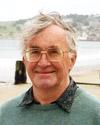
1692 - 1763 Meter: 6.6.6.6 Author of "My Spirit Longs for Thee" in The Cyber Hymnal John Byrom was born in 1691, at Manchester, where his father was a linen-draper. He entered Trinity College, Cambridge, 1708; became a Fellow of the College in 1714; took his M.A. in 1716, and then proceeded to Montpelier, where he studied medicine. He afterwards abandoned medicine, settled in London, and obtained his living by teaching a system of shorthand, which he had projected. He was elected a member of the Royal Society in 1724. He died Sept. 28, 1763. The first edition of Byrom's poems appeared in 1773, in two volumes. A more complete edition was published in 1814. Byrom did not seek publicity as an author, but wrote verses only for recreation.
--Annotations of the Hymnal, Charles Hutchins, M.A., 1872
======================
Byrom, John, M.A., F.R.S., born at Manchester, Feb. 29,1691-2, baptized the same day, and educated at Merchant Taylors' School, and Trinity College, Cambridge, where he graduated B.A. 1712 ; M.A. 1715. He was elected a Fellow of his College in 1714. After studying medicine for a time at Montpellier, he returned to London, and earned his livelihood by teaching shorthand. Elected F.R.S. in 1724, and succeeded to the family estates about the same time. He died Sept. 28, 1763. His Poems were first published in 1773, in two volumes. In 1814 a more complete edition was issued by Nichols, of Leeds. From these Poems less than half a dozen hymns have come into common use. One of these, however, has a repu¬tation which has extended to all English-speaking countries. We refer to his "Christians, awake!" (q.v.). His hymn, "My spirit longeth for Thee," is also worthy of attention.
-- John Julian, Dictionary of Hymnology (1907)
John Byrom


